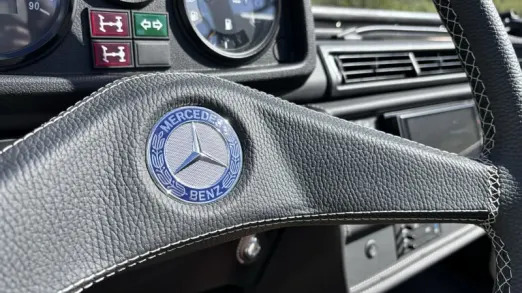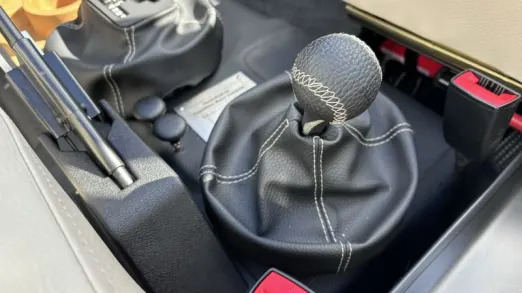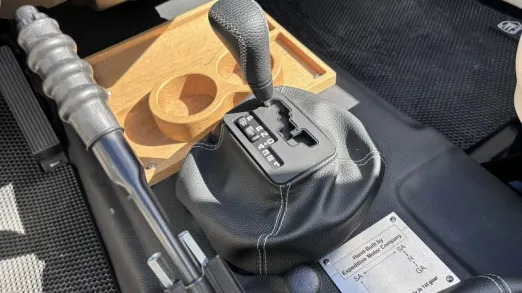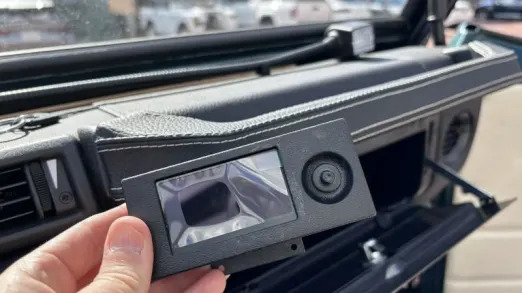Mercedes 250GD Wolf by EMC Review: Classic G Wagen reincarnated

MALIBU, Calif. – The sun is shining, the air is cool, the roof is off and the beltline is low. We’re surrounded in every direction by atypically green mountains in this remote corner of the Santa Monica Mountains. Oh, and the windshield’s down, sealing the deal on the most back-to-basics, horse-like transportation experience possible. Of course, we’re also going 25 miles per hour, which makes things a bit, um, windy.
And if that seems slow, believe me, it really isn’t when there isn’t a windshield in front of you. I really should’ve brought ski goggles. It also isn’t when commanding a Mercedes-Benz 250GD Wolf by Expedition Motor Company, a vehicle that’s equal parts delightful and delightfully slow. You see, this isn’t some over-the-top retromod that stuffs a Corvette crate motor under the hood of some ancient off-roader. Maybe that’s your cup of tea, but it’s not mine, and it’s not Alex Levin’s, either. He would be Expedition Motor Company’s founder, and he’s riding shotgun for this little wind-blasted adventure in Malibu.
Levin explains that the vision for EMC’s G Wagen Wolf is to achieve something that seems more like a restoration than a modification. Owners are seeking a degree of authenticity, both in terms of aesthetics and driving experience. There are upgrades to be sure over what you might’ve found in a civilian G Wagen back in the 1980s, for instance. The paint is better, the upholstery softer, the seats are heated (did I mention it’s chilly with everything off?), suspension components are upgraded, the brakes are way better, and there’s a touchscreen head unit that’ll run CarPlay. There’s one more, but we’ll get to that later. Otherwise, this is not “Pimp My Ride.”
Technically, the Wolf is not a restoration, but more of a reincarnation. That’s because all of the 120-150 donor W461 two-door G Wagens EMC has on hand were in fact former military vehicles, most from Germany. Built from 1990 to 1993, all of the donor 250GDs start in various degrees of rough shape, including the not-so-occasional bullet hole. Some builds take 40 hours of metalwork, some will take 200. Nine out of 10 aren’t drivable. All are complete frame-off “restorations” or whatever might be a more appropriate designation.
Levin says it takes 2,200 hours of labor to (re)create a Wolf. Ninety-eight percent of that is done in EMC’s workshop in Poland, with some finishing touches put on at company headquarters in Frenchtown, N.J. There’s also a shop in Hamburg, Germany, specifically dedicated to building the new injection pumps each diesel inline-five gets. There are 24 employees total in those three facilities, including two technicians who worked on the G Wagen’s original assembly line in Austria.
Click above to see glimpses of the restoration process
Each donor Wolf gets dissasembled down to the frame, and its body is stripped to the bare metal. A corrosion protection treatment is applied, dents are repaired and bullet holes patched. The customer’s preferred paint color, selected from EMC’s curated collection or paint-to-sample, is then applied. As you can see, the Wolf we’re barreling through a canyon au naturel is a perfect shade of Green (that’s literally the color name) accented by crème-colored seats and various black trim details. It looks like the grandfather of today’s G 550 Professional Edition, complete with a wood cargo floor.
The cabin gets new seats, door cards, dashboards and, well, almost everything, as each EMC Wolf did start off life as a rotting hulk in a field. The end result doesn’t look that much different than a real, meticulously preserved, civilian-spec 300GD I drove back in 2019. I had to look at side-by-side pictures to see that EMC’s door cards are much nicer, its climate controls different and the seats covered in a high-quality vinyl that should be easy to clean. The vinyl stitched onto the steering wheel, dash grab handle and shifter boots is a more leather-like material that looks and feels great – it’s also the extent of luxury touches beyond what a civilian G might’ve been like back in the day.


Having driven that 300GD, I can tell you that the EMC Wolf doesn’t feel as agricultural as its original-equipment civilian sibling. Body motions aren’t as roly-poly and the steering seemed sharper, though there’s still plenty of vagueness and on-center play. To achieve this, EMC upgraded the steering damper and adjusted suspension caster to negate the G’s typical steering pull. All bushings were replaced from original Mercedes spec to a customized polyurethane hardness. Heavier-duty springs are placed up front, progressive-rate Eibach springs are added to the rear (they can be set to customer tastes), and the shocks are adjustable Bilsteins. Customers can also specify adjustable Fox shocks for more off-road-oriented builds. Oh, and it was lifted 2.5 inches, which speaks more to how low the military-spec Wolf is/was.
That seems like a lot, but these are smart, strategic choices made to, once again, achieve the perception of authenticity. It also makes the 250GD better to drive and more civilized, while not trying to make it something it’s not.
And as I mentioned right off the bat, EMC’s 250GD Wolf is definitely not fast. The 2.5-liter diesel inline-five is Mercedes’ venerable OM602 that has been dubbed the “million-mile engine” and one of the most reliable ever produced. The one found in each Wolf is almost always the same one that was in the donor. You will note, however, that I did not add “turbo” to “diesel” in the above description. Originally, it produced 91 horsepower and 117 pound-feet of torque. An extra pair of horses gets saddled up thanks to EMC’s rebuild plus the new fuel injector and bored-out pistons, but that’s it in terms of an upgrade. The 0-60 time of 27 seconds I unearthed sure seems about right – if you can get to 60 at all.
Our test drive mostly took place on the Pacific Coast Highway through Malibu, and having driven along that stretch for 23 years now, I can safely say I never realized just how hilly it is until driving the 250GD Wolf. Accelerate with traffic? Foot to the floor. Climbing a “grade” I previously never thought twice about? Foot to the floor and then jab my toe to engage the try-harder detent/button that tells the transmission to kick down yet again. Even then, the diesel was chugging up the hills.


Levin seemed very conscious of this and said on multiple occasions that such hilly terrain is not the 250GD’s forte. That would be correct, but this 250GD Wolf has one final modification that isn’t doing it any favors: an automatic transmission. The five-speed is a “722.6” 5G-Tronic that was found in a laundry list of Mercedes throughout the 1990s and 2000s. Slushboxes of any kind are notoriously power-sapping bad news for low-output vehicles, and this one is no different. A little electronic box stashed in the glovebox lets the owner (or preferably EMC or a technician) tell the transmission control unit (TCU) to change the timing and activation of gear changes. Levin reports he did just that following our drive and saved the setting for future Wolfs that end up in hilly terrain. The reason? As tuned for the drive, it was shifting up-down, up-down, up-down when going up grades despite my foot unwaveringly buried on the pedal and little overrun button.
Even with the adjustability, though, you want the five-speed manual that all of EMC’s 250GD donors have. Levin long resisted customer requests for an automatic, seeing it as a sort of step too far in terms of authenticity. One customer, however, was a veteran who lost a leg, and after struggling without success to fashion a hand control for the clutch, Levin finally gave up and fitted the automatic. Dam thusly breached, about 40% now leave his shop with them.
But why such an obsession with perceived authenticity? It all comes down to why the 30-something Levin started restoring old G Wagens in the first place. The first car he ever drove was his father’s 300GD, presumably not too different from the one I drove back in 2019. And by “drove,” that includes from his father’s lap. I think we can all relate to early car experiences forever shaping our automotive tastes. He would eventually work on restoring classic Land Rover Defenders and Toyota FJs, but the G itch never left him. He had a bid for first refusal on a field-worth of military surplus Wolfs, and when they became available, he pounced. He founded Expedition Motor Company back in 2017.
EMC builds between 24 and 30 units per year, all of which are customer orders. The base price is $165,000 with no-cost choices including exterior paint (20 colors included plus extra-cost paint-to-sample), beige or black roof, clear or amber indicator pods, black or body-color grille, wheels and tires, caliper color, interior upholstery color, light or dark interior wood trim, and with or without a jerry can holder that doubles as the plate holder. Cost options include a winch bumper ($1,000 without winch, $2,000 with it), a bull bar ($1,500), a snorkel kit ($1,000), side steps ($500) and the inward-facing jump seats ($2,000) that allow the Wolf to carry more people than a new G Wagen. By car standards, these are reasonable costs. On the other hand, the automatic goes for $12,500, so you really need to be clutch-averse. If you’re curious, EMC has a handy customizer on their website, though it’s not quite complete, and Levin says they entertain special build requests as long as it “doesn’t cause us to reinvent the wheel.” Or fit an AMG V8.
Speaking of which, the build you see here is basically the exact same price as a brand-new Mercedes-AMG G 63. That may seem nutty, but frame-off restorations of anything are often six-digit expensive, especially rare vehicles for this side of the world like a G Wagen.
“In the world of restoration there are so many different versions and levels of restoration,” said Levin. “It’s the fit and finish or ‘last mile’ that requires the most amount of work, but is so desperately needed for a build quality that you can see and feel. This is only accomplished in the classic Gelandewagen field by the custom development of parts and integrations – something that we have been refining for over seven years, leading each restoration to be an improvement over the last.”
In other words, this isn’t any old restoration, reincarnation, restomod or whatever you want to call it. It’s obvious.



